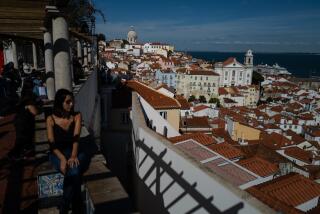Navigating to Prince Henry’s Land
- Share via
On the windy southwestern tip of Portugal is one of Europe’s most popular and historically interesting youth hostels.
The old fortress hostel overlooking the sea beside the village of Sagres was once Prince Henry’s School of Navigation. Centuries ago, young adventurers sought out this place to study the stars before embarking on foreign expeditions. Students of the school included explorers Vasco da Gama, Magellan, Dias and Cabral.
Today, students and young adventurers search out the fortress for inexpensive lodgings near one of the smaller, quieter villages of Portugal’s southern Algarve coast.
Much of the popularity of the Algarve is due to its 200 kilometers of beaches. The key tourism areas are Faro, Albufeira and Lagos. Sagres is about an hourlong bus trip from Lagos; there are numerous departures each day.
The fortress hostel can accommodate up to 50 visitors. The rate is 550 escudos (about $4.30 U.S.) a night. There is an 11 p.m. curfew and a three-night maximum stay. During July, August and September, guests are required to buy dinner, which costs 350 escudos ($2.75).
If the hostel is full or you want more privacy and fewer rules, head for one of the little cafes and inquire about villagers who have rooms for rent.
Historical Film
If your history is a little rusty, you can review the Prince Henry era by watching a 30-minute film at the fortress. It’s open to all visitors. An English-language version is usually screened in mid-afternoon.
At the 14 youth hostels that will operate in Portugal this year, accommodations are available only to members of the International Youth Hostel Federation. If you haven’t joined in your own country, a guest membership will cost 2,000 escudos ($16).
Most Portuguese youth hostels are closed daily from 12:30 to 6 p.m. They also have a midnight curfew. Maximum stay is usually three nights.
This year youth hostels will operate in Lisbon, Porto, Areia Branca, Oeiras, Penhas da Saude, S. Pedro de Moel and at Vila Real de Santo Antonio, which is where you will cross the Spanish border if you’re traveling along the southern coastal route.
Remember that the success or failure of a youth hostel or budget hotel often depends on the personalities of the people who manage the facilities. It’s a situation that is continually changing. Your best bet is to carry a notebook and make a point of asking other travelers for their recommendations, based on recent experiences.
Volunteering for work in a foreign country can be a rewarding experience. However, before you commit yourself, it’s a good idea to study the program carefully and ask a lot of questions.
Sometimes young travelers feel that they are being exploited for cheap labor, but often the result is many new international friends and experiences.
The CIEE (Council on International Education Exchange) has been a sponsor of an international work camp program since 1982. Through the CIEE you can arrange to join projects in Eastern or Western Europe.
Projects this year include restoring a castle or fortress; excavating ancient sites in Portugal, Czechoslovakia, France and Spain; community work in Denmark, Turkey, Wales, West Germany and Holland, and ecological programs in Poland, Hungary and Ireland.
You must be prepared for a two- to four-week commitment and pay a $100 program fee and transportation expenses. Room and board are provided.
Applications are open to those at least 18 years old, or 16 years old for the German program. English is spoken at most camps, except in France and Spain.
Details are available from CIEE International Workcamps, 205 East 42nd St., New York 10017, phone (212) 661-1414.
More to Read
Sign up for The Wild
We’ll help you find the best places to hike, bike and run, as well as the perfect silent spots for meditation and yoga.
You may occasionally receive promotional content from the Los Angeles Times.






